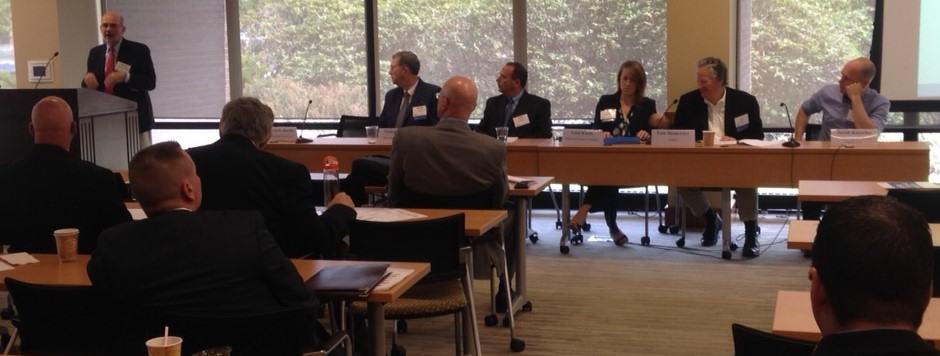
Speaking at podium Michael Della Barba – Director, EH&E; Panel l-r: George Nolan – VP, Baystate Wing Hospital; David Shore – Healthcare Market Executive, EH&E; Lani Kuzia – Project Manager, Brigham and Woman’s Hospital; Tom Sieniewicz – Partner, NBBJ Architecture; Jacob Knowles – Director of Sustainability, BR+A
The Massachusetts Hospital Association Annual Design, Operations & Construction Conference, cohosted by the MA Healthcare Facility Professionals Society, held a sold-out event recently. High-Profile interviewed Tim King, a moderator at the event, to share comments. King is president of Alternative Business Solutions, Middleton, Mass., and provides business development in healthcare for MPA, Margulies Perruzzi Architects.
HP: Will you be back next year?
TK: Absolutely! With this year’s sellout and outstanding panels, we already have great ideas and strong interest in next year’s speakers. The informative and educational nature of this event offers such a great value to the healthcare engineers community. I urge all members of this community to register with the MHFPS (free for healthcare professionals) and participate in the strong educational sessions.
HP: Can you tell us about the panels that you moderated?
TK: The conference led off with an outstanding group of healthcare and real estate professionals discussing the real estate developer model for healthcare properties (new and expanded). More and more healthcare institutions are considering/using third-party developers to help finance projects with a flexible matrix of financial and ownership structures. James Elcock, president and managing partner at Colliers Boston, and Peter McManus,owner/principal at Murphy McManus, openly shared their expertise and experience with many of Boston’s most notable hospitals and how each particular deal is tailored to fit the specific project and administration’s needs.
Renee Mikitarian-Bradley, associate vice president of real estate for the UMass Memorial healthcare system, presented on the vast UMass Memorial real estate structure as well as the different partnering models UMass has engaged, and John P. Duraes, CHFM, director of facilities and engineering at Signature Healthcare, Brockton Hospital, spoke about his current experience with Murphy McManus in building/developing a new cancer center facility with a developer-led team.
Next was a very well-received panel on professional development — directed specifically at the 50+ facilities professionals in the audience and panels. Industry veteran and ASHE Region 1 representative Ed Lydon (associate vice president of support services at Beverly Hospital/Lahey) led the discussion on the many associations and benefits that career-oriented individuals can take advantage of, while Susan Cronin-Jenkins spoke specifically about MGH’s professional structure and what they look for in hiring and developing a team. Cronin-Jenkins is the codirector of Partners/MGH real estate and facilities.
Geoff Slowman, MChE, MBA, CEM, director of facilities at Circle Health (Lowell General Hospital), covered his higher eduction path to facilities excellence through continuing education and two separate master’s degrees to broaden his range of knowledge and attractiveness/marketability in the industry.
The energy and sustainability segment was introduced by Ed Browne, vice president of support services for Cambridge Health Alliance, who gave a short presentation on ASHE’s “Energy To Care” program — a robust cloud-based initiative available to all healthcare facilities to improve energy efficiency and cut costs.
This panel presented as two teams:
David Shore and Michael Della Barba, director of commissioning, represented EH& E and their project at Baystate Wing Memorial, along with George Nolan, regional vice president of support services at Baystate Health System. Their team is implementing a Campus Performance Optimization Program with several energy savings measures (ESMs) throughout the facility and has contract structure that collects a fee only if certain savings levels are achieved. Certainly a great arrangement for George Shore and his Baystate team!
In contrast, Lani Kuzia, planning and construction project manager at Brigham & Women’s Hospital, and her team presented on the brand new Building for the Future research/clinical building and the intense energy planning and technologies that went into that project. Tom Sieniewicz, AIA, AICP, LEED AP, partner, NBBJ Architects, and Jacob Knowles, LEED AP, director of sustainable design at BR+A Consulting Engineers, combined their experience to present a fascinating model of energy excellence.
After a great lunch provided by the MHAS/MHFPS, the day was topped off with a very enjoyable project profile segment — a snapshot of four current projects with a wide range of interesting qualifications.
Brendan Whalen, director, design and construction at Boston Medical Center, described the management of four separate projects using different types and intensities of delivery methods, from pure IPD to design-bid-build. Whalen was clear that he thought IPD to be the best choice for certain projects. Team members were Tocci, Suffolk, Shawmut, TRO, Levi Wong.
Stephanie Nadolny, vice president of hospital operations at Spaulding Rehabilitation Hospital Cape Cod, presented on her facility addition/renovation project with specific focus on rehabilitation and the challenges of continuous operation and network burden. Nadolny also offered insight on navigating the unique decision and finance path from Cape Cod, through Spaulding Boston and then through the Partners organization.
Wendy Gettleman at Dana-Farber Cancer Institute took a different course and spoke about the management of many small and medium (to DFCI) projects as well as maintaining brand control at Dana Farber space at non-DFCI partner facilities. Gettleman is vice president of facilities management and real estate. Although the projects were too numerous to mention teams, Gettleman and her staff work with a the most recognized names in healthcare design and construction.
And finally, Carl Cameron, COO at Holyoke medical center, took us on a roller-coaster ride of financing, planning, and local regulatory hurdles that enabled his to start on a $20 million new emergency department and MOB project in a rural, stand-alone hospital in Western Massachusetts. Cameron and his team did a fantastic job bringing this overdue project to market. The team of SMRT Architects and G. Greene Construction were vital to this effort.
This collaborative event was a huge success. The MHA conference center has a capacity of 110, and we tried to hold the vendor/healthcare professionals ratio to 50/50. With an expected sellout crowd, we offered a free registration to the engineers/facility professionals and asked the support industries to support the conference — which they did with such enthusiasm, a waitlist had to be created. .
The sponsorships sold out, and those who were able to snag a sponsorship spot really got the value out of it. Sponsor Marc Margulies of Margulies Perruzzi Architects stated, “This is by far the best, most educational and efficient one-day healthcare conference I’ve been to. . . . the content, panelists, and crowd were all fantastic!” Other sponsors included Acentech, AKF Group, Lavallee Brensinger Architects, and Sodexo.











